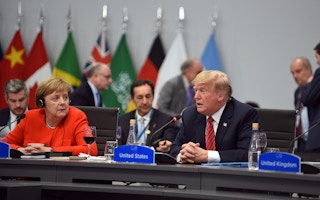Reactionary populism is now the biggest obstacle to tackling climate change. With outright climate denial no longer an option, populist politicians have increasingly positioned themselves as climate doubters and delayers, and this new approach is proving to be quite insidious. The Intergovernmental Panel on Climate Change warns that global greenhouse gas emissions must peak within three years to keep the Paris agreement’s 1.5 degree Celsius target in reach; by slowing effective action, the tactics of today’s populists are becoming an existential threat.
This trend is reversible, but it is tenacious. Following former United States president Donald Trump’s dismantling of America’s climate commitments, the Biden administration has managed to pass landmark climate legislation despite notable headwinds. But opportunities for populist climate spoilers remain. A recent study in Nature shows that even though supporters of climate policies vastly outnumber their opponents nationwide, most Americans believe the opposite to be true. Given this “false social reality”, the climate legislation promises to be a wedge issue in November’s midterm elections.
Perhaps even more significant is Brazil, where reactionary populism threatens to become normalised under President Jair Bolsonaro. It is no coincidence that Steve Bannon, Trump’s former chief strategist, sees Brazil’s election as an inflection point for the international system: in his words, the “second most important election in the world”. Bannon-style tactics have prevailed in many countries in recent years, poisoning the public discourse on issues such as immigration, reproductive rights and vaccines.
There are multiple reasons why climate action is an especially appealing target for aspiring and incumbent authoritarians, but none has anything to do with the climate itself. The first reason is the perceived cost. Even though decarbonising and building more resilience into the economy will ultimately be much cheaper than covering the costs of a runaway climate crisis, such outlays will forever be exposed to political opportunists’ bad faith attacks.
Moreover, populists will smear policies geared toward international accords like the 2015 Paris climate agreement as an abdication of sovereignty. It is no surprise to see Brexit architect Nigel Farage now agitating for a referendum on the United Kingdom’s stated commitment to achieve net-zero emissions.
A simplistic notion of national sovereignty has also underpinned Bolsonaro’s refusal to discuss the Amazon in international fora, even though its role as a carbon sink is vital for the rest of the world. Bolsonaro’s failure to fight criminal activity in the Amazon has allowed for the wanton destruction of Brazil’s forests, rivers, and people (including indigenous groups, environmental activists, and journalists). As is true of other right-wing populists, “sovereignty” for him amounts to claiming rights but denying the responsibilities that come with them.
Out of either cynicism or naivety, populists refuse to acknowledge that stronger national borders cannot solve our biggest problems. That is as true for climate change and biodiversity loss as it is for this year’s energy and food crises, Covid-19, and mounting debt distress. As a result, climate action and reactionary populism could remain tangled for decades to come, amid climate disruptions, sharpening inequalities, and a social contract fraying everywhere.
According to a recent study of 25 countries over more than a decade, right-wing populist parties have had a consistently negative impact on climate ambition, making international targets even harder to reach. As the host of the foundational 1992 Earth Summit, Brazil previously had a reputation as a leading consensus builder in multilateral negotiations; yet in the space of just a few years, it has come to be associated with diplomatic volatility and environmental destruction.
If we are going to manage the increasingly disruptive effects of climate change, collective intelligence must prevail over populist division and disinformation. Some countries are already showing the way. In Australia, for example, voters ousted a conservative government that had become one of the most obstinate climate laggards in the G20. And in Slovenia, a populist prime minister was denied a second consecutive term when his party was defeated by the environmentalist Freedom Movement party.
Could the same message gain traction in Brazil? Recent polling shows that 81 per cent of Brazilians want presidential candidates to protect the Amazon, and 65 per cent consider such protections to be important for economic development. Over 90 per cent know that climate change is happening, and over 75 per cent attribute it to human activity.
As in many countries around the world, social movements in Brazil have been organizing on an unprecedented scale. Groups from the Amazon – especially those representing traditional communities, women, and young people – are leading the charge, and others, including financial and private-sector players, have joined with them.
Bolsonaro, meanwhile, has remained hostile toward climate ambition, painting all environmental concerns as the sinister creation of shadowy international interests. The irony, of course, is that today’s “anti-globalist” populists rely on their own well-funded transnational network of propagandists, donors, and fellow-travellers. As a recent New York Times investigation shows, Hungarian energy companies that have profited from the sale of Russian oil have channelled massive funds to politically-aligned charities, where the funds then make their way to conservative broadcasters and opinion leaders in the United States.
An international system subverted by populist priorities would be catastrophic for open societies and effective climate policies. Those of us who believe in science, the wisdom of local communities, and the power of diplomacy must get wise to the threat. If populism is normalised, it will derail effective climate action just when it is needed most. The window for preventing catastrophic consequences is closing. Climate policies have become populists’ most inviting target; the rest of us must become populists’ most formidable adversaries.
Izabella Teixeira, a former environment minister of Brazil, is co-chair of the International Resource Panel. Ana Toni is executive director of Instituto Clima e Sociedade (iCS). Laurence Tubiana, a former French ambassador to the United Nations Framework Convention on Climate Change, is CEO of the European Climate Foundation and a professor at Sciences Po, Paris.
Copyright: Project Syndicate, 2022.
www.project-syndicate.org













